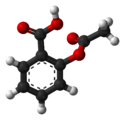Aspirin, also known as acetylsalicylic acid (ASA), is a medication, often used to treat pain, fever, and inflammation.[2] Aspirin is also used long-term, at low doses, to help prevent heart attacks, strokes, and blood clot formation in people at high risk of developing blood clots.[3] Low doses of aspirin may be given immediately after a heart attack to reduce the risk of another heart attack or the death of heart tissue.[4][5] Aspirin may be effective at preventing certain types of cancer, particularly colorectal cancer.

The main side effects of aspirin are gastric ulcers, stomach bleeding, and ringing in the ears, especially with higher doses. While daily aspirin can help prevent a clot-related stroke, it may increase risk of a bleeding stroke (hemorrhagic stroke).[9] In children and adolescents, aspirin is not recommended for flu-like symptoms or viral illnesses, because of the risk of Reye's syndrome
